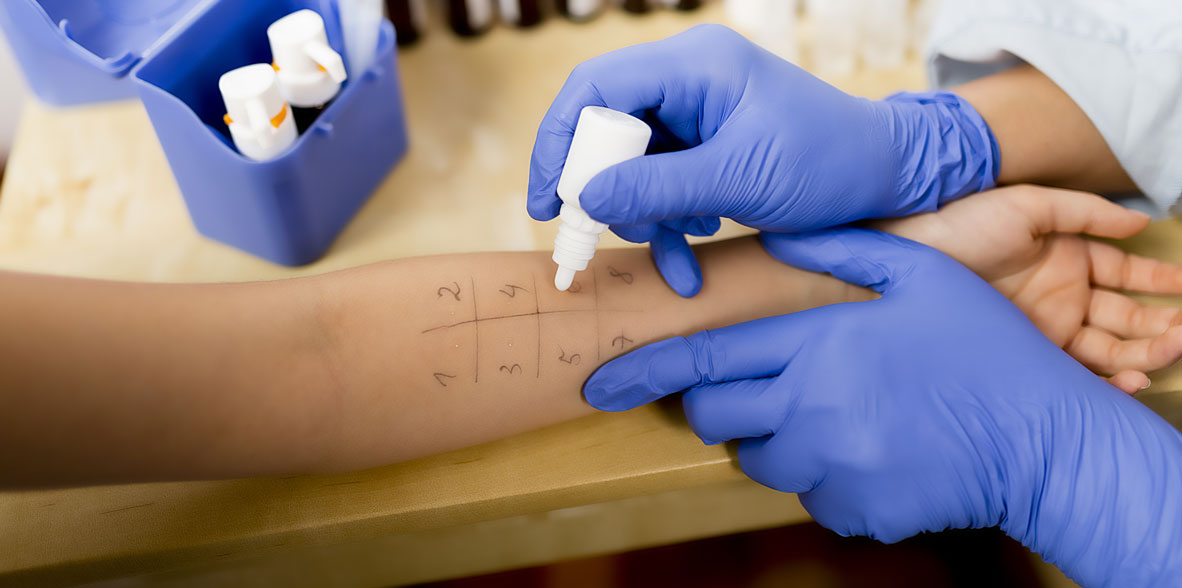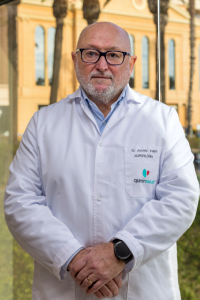

 Centro Médico Teknon
Centro Médico Teknon- Centro Médico Teknon
- Centro Médico Teknon
- Centro Médico Teknon
What is immunotherapy and allergy vaccination?
Anti-allergic immunotherapy consists of administering small progressive doses of the same allergen to which an individual is sensitized with the aim of reducing the level of sensitization and suppressing the symptoms it causes. The allergenic material that is administered, duly modified to suppress side effects and increase its capacity to stimulate the immune system, is called anti-allergic vaccine.
Immunotherapy has been applied in medicine for more than 90 years and according to the World Health Organization, to date it is the only treatment that can favorably modify the natural course of some allergic diseases.
- When is allergy vaccination indicated?
This treatment has precise indications in bronchial asthma and allergic rhinitis, as well as in hymenoptera allergy. Currently there is some experience with some foods such as peaches.
For a specific vaccine to be indicated, the following requirements must be met:
- That the disease is due to an immunological reaction mediated by immunoglobulin E (IgE), demonstrable by skin tests, analysis and if necessary by provocation tests.
- That the triggering allergen(s) has (have) been fully identified and that standardized extracts suitable for systemic treatment are available.
- That the patient does not suffer from any type of immunological deficiency that could render the immunotherapy ineffective.
- That the balance between benefit and risk of the treatment is clearly in favor of the former.
- That the patient or his relatives, in the case of children, are perfectly aware of the characteristics of immunotherapy, accept them and are in a position to apply it correctly and to attend the necessary controls to adapt and monitor the treatment.
- How are the results of allergy vaccination?
Immunotherapy may show its beneficial effects a few months after its initiation, but optimal effects and consolidation are usually achieved within 3 to 5 years.
The treatment is allergen specific. The results are better in patients with only one type of allergy, but it is possible to administer two or more vaccines with different allergens simultaneously, obtaining desensitization for each of them.
Immunotherapy is compatible with medication contracts with drugs that suppress the symptoms such as antihistamines, anti-inflammatory inhalers and bronchodilators, etc. It is not suitable for use in patients receiving oral corticosteroids at high doses and for prolonged periods.
- How is immunotherapy administered?
 Until a few years ago, only subcutaneous injectable allergy vaccines were available. Nowadays, there are vaccines for sublingual administration, useful in some specific cases.
Until a few years ago, only subcutaneous injectable allergy vaccines were available. Nowadays, there are vaccines for sublingual administration, useful in some specific cases.It is recognized that injectable vaccines with depot extracts are the most active and effective, although they may also present more side effects, although these are very rare and in the vast majority of cases are limited to some local reaction at the injection site, especially if they have not been applied correctly. On the other hand, modified extracts are available, called alergoids, which are much better tolerated, although their potency is lower.
 Immunotherapy is administered continuously throughout the year (perennial or co-seasonal treatment) or in so-called "pre-seasonal" patterns in some patients allergic to certain pollens of plants or trees with short pollination periods (e.g. cypress). The most appropriate regimen will be established individually for each patient and situation.
Immunotherapy is administered continuously throughout the year (perennial or co-seasonal treatment) or in so-called "pre-seasonal" patterns in some patients allergic to certain pollens of plants or trees with short pollination periods (e.g. cypress). The most appropriate regimen will be established individually for each patient and situation.The beginning of the treatment or induction phase means the progressive increase of allergen doses in weekly periods, which depending on the type of vaccine may require from 1 week to 3 months, depending on the type of vaccine. Once the optimal and sufficiently high dose is reached to ensure clinical efficacy without adverse effects, maintenance treatment is started with injections once a month.
Shorter schedules are available and in special cases they can be shortened by administering grouped doses in a short time, although this implies an increase in the possibility of undesirable reactions.
In sublingual vaccines, the induction period is very short, but maintenance is based on daily administrations over many months.
Hymenoptera venom immunotherapy can only be administered subcutaneously and following a very strict protocol. However, its efficacy is very high and prevents serious reactions if the patient is stung by bees or wasps.
- What are the risks of immunotherapy?
Local reactions in injectable administration are not exceptional, but are not serious. Inflammation, redness and itching may occur at the injection site, especially when high doses of vaccine are administered. In the great majority of cases, it can be prevented and minimized with measures indicated by the specialist.
General or systemic reactions of immediate onset within 15-30 minutes after injection are rare and can be mild (localized urticaria, rhinitis), moderate (asthma, angioedema) or severe (anaphylactic reaction). It is therefore necessary that after each injection the patient remains under observation in the medical center for about 30 minutes.
General reactions can occur mainly if the immunotherapy is performed without adequate control, if there are errors in the dosage or if the patient receives the vaccine with some type of underlying allergic pathology such as fever, asthma or urticaria, without treatment.
- Monitoring of immunotherapy
From the above it is clear that a patient receiving immunotherapy of any type, but especially depot injectables, should be monitored periodically by the specialist, preferably several times a year and especially in the induction period, until the maintenance dose is reached.
Vaccines should be administered by trained professionals in adequate medical centers that have the means to deal with an unexpected adverse reaction.
Once the safety and good tolerance of the vaccines have been proven, the specialist must control their efficacy, for which a series of parameters will be taken into account:
- Clinical improvement in the frequency and intensity of symptoms, compared to before starting immunotherapy.
- Decrease in the number of sick leaves or school absenteeism.
- Decrease in the need for symptomatic pharmacological medication (antihistamines, bronchodilators, etc.).
- Objective tests: changes in respiratory functionality.
- Changes in blood tests, appearance of specific immunoglobulin IgG4 due to the effect of the vaccine.
- Decrease in the concentration of allergen required for the conjunctival challenge test.
- Decrease in the size or even disappearance of reactions when performing a skin test.
It should be kept in mind that immunotherapy of any kind is a long treatment that should be applied for a minimum of 3 years to consolidate the effects on the patient's immune system. For this reason the patient must be aware, maintain contact with the treating specialist and be cooperative at all times. On the other hand, the allergist must support the patient in the treatment with vaccines and be available to answer his queries and attend him in case of need.



































